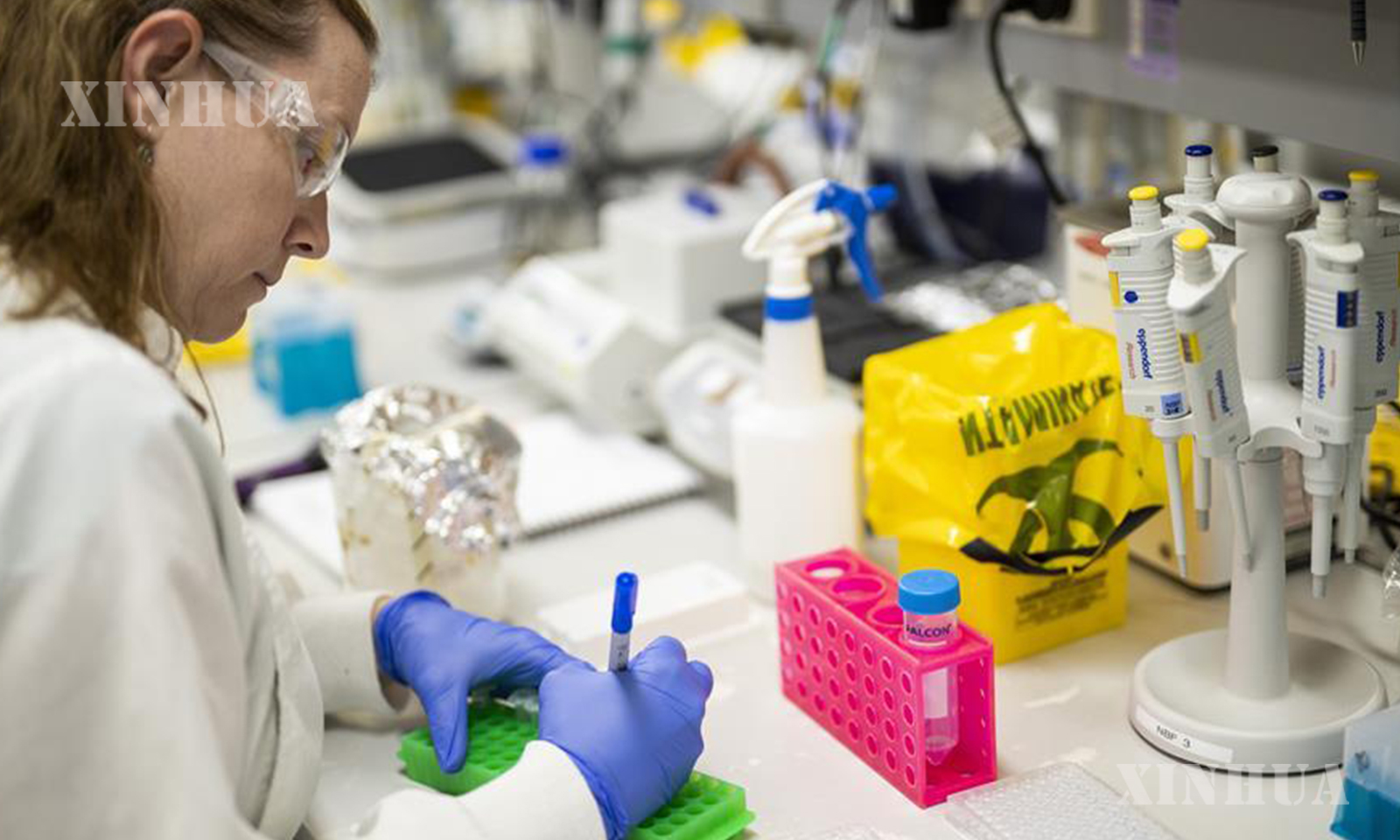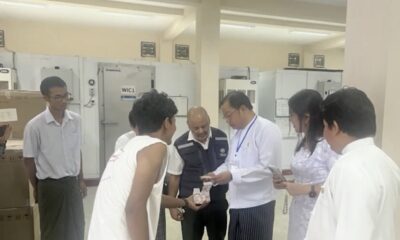Europe
ဩစတြေးလျနိုင်ငံတွင် COVID-19 ရောဂါ တတိယလှိုင်းရင်ဆိုင်နေရသဖြင့် အားဖြည့်ကာကွယ်ဆေးထိုးနှံခြင်း အစီအစဉ်ကို နိုဝင်ဘာလတွင် စတင်မည်

ကန်ဘာရာ၊ အောက်တိုဘာ ၂၈ ရက် (ဆင်ဟွာ)
ဩစတြေးလျနိုင်ငံတွင် ကိုဗစ်-၁၉ (COVID-19) ရောဂါကူးစက်မှု တတိယလှိုင်းကို ဆက်လက်ရင်ဆိုင်နေရသဖြင့် နိုဝင်ဘာ ၈ ရက်တွင် အရွယ်ရောက်ပြီးသူများအတွက် ကိုရိုနာဗိုင်းရပ်စ် အားဖြည့်ကာကွယ်ဆေးထိုးနှံခြင်း အစီအစဉ်အား စတင်သွားမည်ဖြစ်ကြောင်း သိရသည်။ဩစတြေးလျနိုင်ငံ ကာကွယ်ဆေးထိုးနှံခြင်းဆိုင်ရာ နည်းပညာအကြံပေးအုပ်စု (ATAGI) က ဩစတြေးလျနိုင်ငံသားများအတွက် Pfizer အားဖြည့်ကာကွယ်ဆေးများကို အောက်တိုဘာ ၂၈ ရက်၌ ခွင့်ပြုခဲ့ကြောင်း သိရသည်။
“အားဖြည့်ကာကွယ်ဆေးထိုးနှံခြင်း အစီအစဉ်တွေကို အထူးသဖြင့် သက်ကြီးစောင့်ရှောက်သူများနဲ့ ကျန်းမာရေးအလုပ်သမားတွေမှာ သိသိသာသာ အာရုံစိုက် ဆောင်ရွက်သွားမှာဖြစ်ပါတယ်။ ဒါပေမဲ့ အားဖြည့်ကာကွယ်ဆေးထိုးနှံခြင်း အစီအစဉ် လူဦးရေအားလုံးအတွက်လည်း ဖြစ်ပါတယ်” ဟု ဝန်ကြီးချုပ် စကော့ မောရစ်ဆင် (Scott Morrison) က ပြောခဲ့သည်။
အားဖြည့်ကာကွယ်ဆေးထိုးနှံခြင်း အစီအစဉ်အား လက်လှမ်းမီနိုင်သော အစီအစဉ်မှတစ်ဆင့် သက်ကြီးစောင့်ရှောက်မှုအဆောက်အအုံများနှင့် မသန်စွမ်းပြည်သူများနှင့် အတူနေထိုင်သူများအား တိုက်ရိုက်ဆောင်ရွက်သွားမည်ဖြစ်ကြောင်း ဝန်ကြီးချုပ်က ပြောကြားခဲ့သည်။
ဒုတိယအကြိမ် ကာကွယ်ဆေးထိုးနှံပြီးနောက် ၆ လကြာပါက ရှေ့တန်းကျန်းမာရေးဝန်ထမ်းများအား အားဖြည့်ကာကွယ်ဆေးထိုးနှံရေးအတွက် စာရင်းပေးရန် “အခိုင်အမာ တွန်းအား” ပေးခဲ့ကြောင်း သိရသည်။
အောက်တိုဘာ ၂၇ ရက်အထိ အသက် ၁၆ နှစ်နှင့်အထက် ဩစတြေးလျနိုင်ငံသား ၈၇.၆ ရာခိုင်နှုန်းသည် ကာကွယ်ဆေး တစ်ကြိမ်စီ ထိုးနှံထားပြီးဖြစ်သလို ၇၅.၅ ရာခိုင်နှုန်းမှာမူ ကာကွယ်ဆေး အပြည့်အဝထိုးနှံပြီးဖြစ်ကြောင်း ကျန်းမာရေးဦးစီးဌာနအရ သိရသည်။
ဩစတြေးလျနိုင်ငံတွင် အောက်တိုဘာ ၂၈ ရက်၌ ဒေသတွင်း ကိုဗစ်-၁၉ ရောဂါကူးစက်မှုအသစ်၂,၂၀၀ ကျော်ရှိခဲ့ပြီး သေဆုံးသူ ၂၆ ရာခိုင်နှုန်းရှိကြောင်း သိရသည်။
ရောဂါဖြစ်ပွားသူအသစ်များမှာ နိုင်ငံအတွင်း ရောဂါဖြစ်ပွားမှု ဒုတိယအများဆုံးပြည်နယ်ဖြစ်သည့် ဗစ်တိုးရီးယားပြည်နယ်၌ ဖြစ်ပြီး ရောဂါဖြစ်ပွားမှု ၁,၉၂၃ ဦးနှင့် သေဆုံးသူ ၂၅ ဦးရှိခဲ့သည်။
မောရစ်ဆင်သည် အောက်တိုဘာ ၂၇ ရက်က အရှေ့တောင်အာရှနိုင်ငံများနှင့် ထပ်တိုး ကာကွယ်ဆေး ၁၀ သန်း မျှဝေရန် ကတိပြုထားခဲ့သည်။“နောက်နှစ်လယ်မတိုင်မီမှာ ကျွန်တော်တို့ရဲ့ ပြည်တွင်းထောက်ပံ့မှုကနေ အနည်းဆုံး ထပ်တိုးကာကွယ်ဆေး ၁၀ သန်းကို အာဆီယံအဖွဲ့ဝင်နိုင်ငံတွေနဲ့ မျှဝေသွားမယ့်အရေး တရားဝင်အသိပေးရတဲ့အတွက် ကျေနပ်မိပါတယ်” ဟု အာဆီယံ-ဩစတြေးလျ အွန်လိုင်းထိပ်သီးအစည်းအဝေး၌ ၎င်းက ပြောကြားခဲ့သည်။ (Xinhua)
————————————————
(English Version)
Australian COVID-19 vaccine booster program to start in November amid battle against 3rd wave
2
CANBERRA, Oct. 28 (Xinhua) — Australia’s coronavirus vaccine booster program will start for the adult population on Nov. 8 as the country continues to battle the third wave of COVID-19 infections.
The Australian Technical Advisory Group on Immunisation (ATAGI) on Thursday approved Pfizer booster shots for Australians aged 18 and over six months after their second dose.
“Those booster programs will obviously have a focus, especially on aged care and health workers, but it is an all of, whole of population booster program,” Prime Minister Scott Morrison said.
The booster program will roll out directly to people living in Residential Aged Care Facilities and people with a disability through an in-reach program, according to the prime minister.
And frontline workers “are strongly encouraged” to book in to get a booster dose, if six months has passed since their second dose.
As of Wednesday 87.6 percent of Australians aged 16 and over had received one vaccine dose and 75.5 percent were fully inoculated, according to the Department of Health.
On Thursday, Australia reported more than 2,200 new locally-acquired COVID-19 infections and 27 deaths.
The majority of new cases were in Victoria, the country’s second-most populous state with Melbourne as the capital city, where 1,923 cases and 25 deaths were reported.
Morrison on Wednesday committed to sharing an additional 10 million vaccine doses with Southeast Asian countries.
“I am also pleased to advise that we will share at least an additional 10 million doses from our domestic supply with ASEAN countries by mid-next year,” he told the the ASEAN-Australia Virtual Summit. Enditem
File photo taken on April 1, 2020 shows a researcher working at a lab of University of Queensland (UQ) in Brisbane, Australia. (University of Queensland/Handout via Xinhua)






